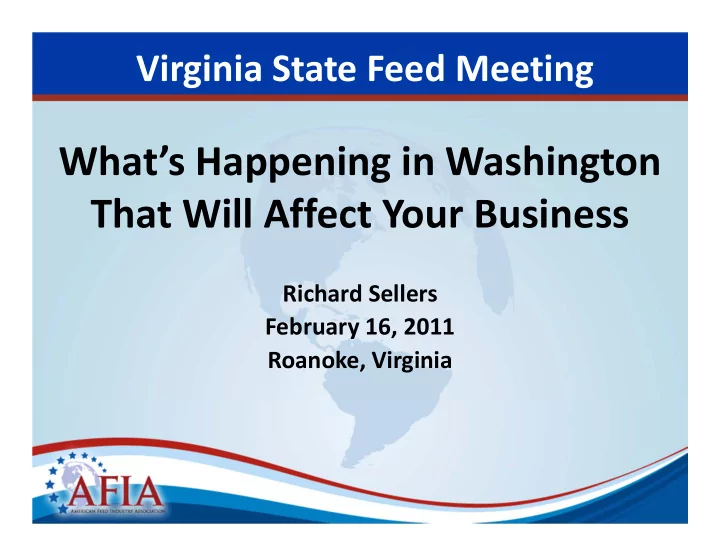

Virginia State Feed Meeting What’s Happening in Washington That Will Affect Your Business Richard Sellers February 16, 2011 Roanoke, Virginia
Food Safety Modernization Act “Law represents a sea change for food safety in America” –Dr. M. Hamburg, FDA Commissioner “Most significant change in FDA regulation of Feed since 1958” ‐ AFIA
New Laws Apply To All Ingredient Processing All Feed Manufacturing Pet Food Feed & Ingredient Imports Transportation
Facility Registration • Biennially vs. One ‐ Time (2012) • May be suspended by FDA—Suspended registration means plant shutdown
Hazard Analysis & Preventive Controls • Conduct Hazard Analysis • Develop & implement written preventive controls plan: monitoring, verification, corrective actions, record keeping • Regulations due 18 months (July 2012)—probably earlier! • FDA may exempt or modify requirements for facilities that are “solely engaged in the production of food for animals other than man”
New Fees: • Foreign & Domestic Re ‐ inspections • Failure to comply with recall order • Participation in voluntary qualified importer program • Re ‐ inspections at ports of entry • Issuing export certifications for food (not available previously, now $175) Immediate •
Inspections: • Inspect registered Facilities according to risk profile • Minimum inspection once every 5 years >High Risk ‐ within 5 years; every 3 years >Low Risk ‐ within 7 years; every 5 years • Regulations due 18 months (July 2012)
Traceability; Recordkeeping • New recordkeeping requirements for designated high risk manufacturers (drug or premix products) • Limitations include farms and “comingled raw agriculture commodities” • Regulations due 24 months (Jan 2013) •
Records Access • Reasonable belief that a particular article of food is adulterated and possesses a threat of serious adverse health consequences or death to humans or animals, FDA may have access to all records relation to that article of food and any other article of food that the secretary believes is likely to be affected in a similar manner. • Immediate Deter copying – confidentiality of documents •
Mandatory Recall Authority • Opportunity for voluntary recall • May issue order to immediately recall if voluntary recall not completed • Must offer opportunity for informal hearing within 2 days of order issuance • May only be ordered by FDA commissioner • Serious adverse health consequences, death… • Immediate
Administrative Detention • FDA has authority to administratively detain an article of food if FDA has “reason to believe” that article is adulterated or misbranded • Rule in 120 days, effective 180 days (July 2011)
Third ‐ Party Certifications • FDA authority to accredit third ‐ party auditors to certify eligible foreign facilities ‐ International SF/SF option • System due 24 months (Jan 2013) • FDA has authority and has piloted accreditation of auditors of domestic food safety programs ‐ Safe Feed/Safe Food
Import Requirements • Every US importer required to perform risk ‐ based foreign supplier verification activities to verify food is not adulterated • Regulations 24 months (Jan 2013) • Foreign supplier verification program content specifics • Regulations 12 months (Jan 2012) • Establish a voluntary qualified importer program to expedite import process. Export facility must be certified by an accredited third ‐ party auditor ‐ International SF/SF option • Guidance 18 months (July 2012)
Food Safety Transportation Act • Regulations on sanitary transportation of food (recordkeeping, ID prior to loads, back hauling etc) • Regulations due 18 months (July 2012)
Performance Standards • Review of relevant health data to determine most significant food borne contaminants and where appropriate, contaminant specific performance standards • Shall exempt or modify requirements for facilities that are “solely engaged in production of food for animals other than man” • Not less frequently than every two years
Legislative Wins by Industry • Mandatory regulatory recognition of feed vs. human food facility regulation (four key sections) • No registration fees (House bill up to $150,000) • Follows Safe Feed/Safe Food process • Limited increase in records access • Recognition and use of third ‐ party certification programs • Export certification (required by many countries)
What is AFIA Doing? • Formed Five Working Groups • Records/Registration Hazard ID/Risk Management Plan Performance Standards Mandatory Recall and Administrative Detention Foreign Supplier Verification/Qualified Import Program • Seven association committees are involved
What is AFIA Doing? • Three charges: • Review what has been enacted and what it says. Tell AFIA what it should do (webcasts, reports, guidance documents, etc. Assist AFIA in preparing comments, webcasts, guidance documents, if needed.
What Should You Do? • Read the law or the legal memos • Read related e ‐ mails from AFIA • Take part in webcasts, read guidance documents, offer input to draft comments about your industry segment • Comply, comply, comply as best you can
What’s the Future? • Massive work by FDA—it knows it cannot do it all • Funding—House appropriators not expected to provide funding for the act • We are urging FDA to collaborate with industry on guidance documents—we have the expertise.
AFIA’s 4 Promises to Our Members… Thank you! Discussion
Recommend
More recommend